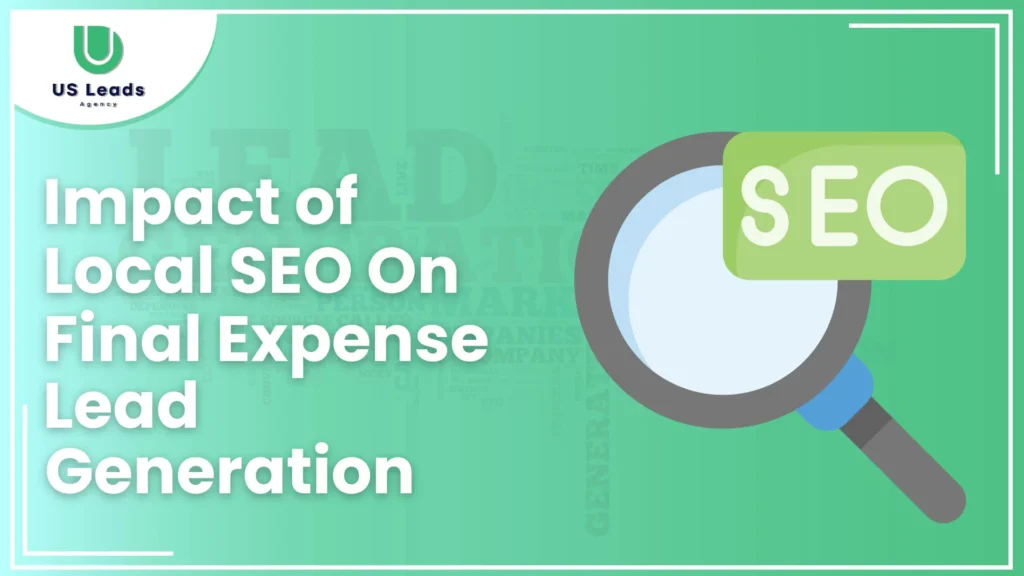
Final expense insurance offers essential financial support for families managing end-of-life costs. With growing demand, providers need effective strategies to connect with local audiences. Local SEO (Search Engine Optimization) has emerged as a transformative tool, helping insurance providers build trust, generate high-quality leads, and target their communities effectively.
This guide delves into the impact of local SEO on final expense lead generation and provides practical strategies for success.
Key Takeaways:
- Precision Targeting: Focus on specific geographic areas for high-quality leads.
- Enhanced Trust: Build credibility through positive online reviews.
- Cost-Effective Growth: Sustainable lead generation with minimal recurring costs.
- Mobile Optimization Matters: Cater to local mobile searches with a responsive site.
Table of Contents
What Is Local SEO?
Local SEO optimizes a business’s online presence to attract customers from specific regions. It includes:
- Claiming and enhancing Google Business Profiles.
- Creating local citations on directories like Yelp and Bing Places.
- Using localized keywords and geo-specific content.
- Encouraging reviews from satisfied local customers.
For final expense insurance providers, these techniques enhance visibility and build trust in local communities.
Impact Of Local SEO On Final Expense Lead Generation:
1. Targeting Localized Audiences:
Final expense insurance decisions often involve families, making local targeting vital. Local SEO ensures marketing efforts reach seniors and their families effectively.
2. Improved Search Visibility:
Appearing in top search results for terms like “final expense insurance near me” drives qualified leads to your site.
3. Building Trust Through Reviews:
Online reviews reassure potential clients, establishing credibility for sensitive services like final expense insurance.
4. Increased Website Traffic and Lead Conversion:
Localized content attracts the right audience, increasing the likelihood of consultations or quotes.
5. Cost-Effective Marketing:
Local SEO efforts provide continuous returns, unlike paid ads, which require ongoing investment.
Local SEO Strategies For Final Expense Insurance Providers:
- Optimize Google Business Profile: Use localized keywords, accurate contact details, and visuals.
- Local Keyword Research: Focus on phrases like “affordable final expense insurance in [City].”
- Content Marketing: Publish local guides, blogs, and testimonials to foster trust.
- Leverage Online Reviews: Encourage satisfied clients to share their experiences.
- Build Local Citations: Consistent listings on directories enhance local search rankings.
- Mobile Optimization: Ensure a fast, mobile-friendly website for on-the-go users.
Real-World Success: Local SEO in Action
A Dallas-based agency increased website traffic by 45% within six months using local SEO tactics. Optimizing their Google Business Profile, targeting local keywords, and encouraging reviews led to improved lead quality and conversions.
Conclusion – Impact Of Local SEO On Final Expense Lead Generation:
Local SEO isn’t just an option for final expense insurance providers—it’s essential. By embracing localized strategies, businesses can connect with their audience, establish trust, and generate sustainable leads. As local search behaviors evolve, optimizing for your community ensures your agency remains competitive.
FAQs:
How do online reviews impact local SEO for insurance businesses?
Positive reviews boost search rankings and enhance credibility, helping attract more clients.
What are the top strategies for boosting local SEO?
Optimize your Google Business Profile, research local keywords, generate reviews, and create geo-specific content.
How does local SEO save money compared to traditional advertising?
Local SEO provides long-term visibility without recurring advertising costs, making it cost-efficient.
Can local SEO work for smaller insurance agencies?
Yes. Local SEO levels the playing field, helping small agencies compete in niche markets.
Why is mobile optimization crucial for local SEO?
Most local searches happen on mobile devices, so a mobile-friendly site ensures better user experience and visibility.
